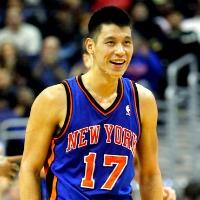BROOKE GLADSTONE:
From WNYC in New York, this is On the Media. Bob Garfield is away this week. I'm Brooke Gladstone, breaking my stereotype with sports news!
ANNOUNCER:
Linsanity continues.
SPORTSCASTER:
And the legend grows. Jeremy Lin, the NBA's newest superstar hits a last-second shot, to lift his New York Knicks.
SPORTSCASTER:
The Jeremy Lin-sanity tour continued its incredible ride in Toronto last night.
STEPHEN COLBERT:
I've got a raging case of Lin-sanity. I have been declared legally Lin-sane!
BROOKE GLADSTONE:
Talk about breaking stereotype, Jeremy Lin is a 23-year-old Harvard grad and the current starting point guard for the New York Knicks. He was a bench warmer until a few weeks ago when, due to happenstance, Lin got some playing time and played unbelievably well. Now, he's famous. And he's Asian-American. From a New York Post headline titled, "Amasian" to an article in The Atlantic attributing his skill on the court to an Asian holistic view of the world, Lin's race is as much of a story as his game-winning shots. The attention has been mostly well-intended says NPR sports correspondent Mike Pesca, but not entirely.
MIKE PESCA:
There was a tweet by a boxer named Floyd Mayweather, and he said something along the lines of, you know, what Jeremy Lin is doing is ordinary for a black athlete to do. If a black athlete did it, no one would be paying attention. That was embarrassing, but everyone's pretty on board with loving a Cinderella.
BROOKE GLADSTONE:
Right, they love Cinderella but they can't seem to love him without making observations about his race.
MIKE PESCA:
Just because someone talks about race doesn't mean that that motivation of that person is racist. And I think it's totally legitimate to note that he's the first Asian-American in the NBA in over 50 years, that, in fact, in college, in Division I in college, there were only 19 Asian-Americans when he was playing, that this has become such a huge phenomenon in the Asian-American community and in Asia itself.
That’s all legitimate, and I see it more along the lines of a positive racial or ethnic celebration. It belongs in the conversation the same way when Tiger Woods established himself as a great golfer, people rightly noted, wow, this has an opportunity to open up the sport to a demographic that, you know, didn't care about golf before.
BROOKE GLADSTONE:
So when The New York Post has a headline like "Amasian" —
[MIKE LAUGHS]
— that's fine. But, you know, talk about stereotyping, that boxer's tweet that you mentioned.
MIKE PESCA:
Yeah.
BROOKE GLADSTONE:
It seemed to me that he was expressing the unspoken prejudices of, you know, black people have height and muscles and Asians are small and brainy.
MIKE PESCA:
Basketball is 75 percent African-American, and so when anything unusual happens — I mean, this the definition of news - it's new. But it's not just that Asian kid does well, right? If Jeremy Lin were the number one overall draft pick, perhaps the Asian angle wouldn't be so prominent because we'd have had a chance to digest it.
BROOKE GLADSTONE:
It's because he's "Linderella."
MIKE PESCA:
Yeah, it's the three things going on at once. It's Harvard, it's Asian-American and it's consistently cut, never given a chance; therefore, he came out of nowhere. Oh, and then, of course, the fourth angle, it's New York basketball and media capital of the world. And you take away any one of those things and I think it becomes a compelling sports story. But with the mix of all those things, it becomes a story that, um — you know about. [LAUGHS]
BROOKE GLADSTONE:
[LAUGHS] Even me.
MIKE PESCA:
Yes. And my only problem with the Lin coverage is just the amount of it. I mean, Thursday on ESPN - began its coverage on Sports Center with, I think, eight minutes of Lin highlights. There was setup to the story, there were the highlights of the game, there was reaction from the teammates, there was Lin's quotes, and there was an expert breaking down how he did what he did.
Then they did some football stories, and then at 15 minutes after the hour they have little slugs that they put on the side of the screen. And here were the stories they were gonna cover: "Linsanity Reigns, Lin an All-Star, Steven A. on Lin Mania, Hype at Garden, Melo on Lin, How Good Can the Knicks Get?"
And, by the way, that one story, "Lin an All-Star" - here's the story, you ready? "During the slam dunk contest, he'll be lobbing the ball to his teammate." [LAUGHS]
[BROOKE LAUGHS]
And I swear they prefaced it with an un-ironic, "This just in," although maybe they said, "This just Lin." [LAUGHS]
[BROOKE LAUGHING]
So what we have to do as sports fans is just repeat the mantra, "I will not let oversaturation ruin a great story, I will not let oversaturation ruin a great story."
BROOKE GLADSTONE:
How much of this has to do with the fact that it's so easy to rhyme with Lin?
MIKE PESCA:
Oh, yeah. I mean, I saw David Letterman's list of worst Lin puns, and they were really good.
[CLIP]:
DAVID LETTERMAN:
And number 7, Linternational House of Lincakes, Number 6 -
[AUDIENCE LAUGHTER]
- Newt Lingrich. Number 5, Linterest-Bearing Linvestment Grade Financial Linstrument.
[LAUGHTER]
[END CLIP]
MIKE PESCA:
There's another thing name-wise. I think he benefits from the fact that he's always the two-name guy in the announcer's throat. So it's always, "Stoudemire passes, Chandler gets the ball and Jeremy Lin with the flush!
[BROOKE LAUGHS]
It's always, "Jeremy Lin breaks down the defense!" So that's kind of nice for name recognition.
BROOKE GLADSTONE:
Mike, thank you so much.
MIKE PESCA:
You're welcome.
BROOKE GLADSTONE:
Mike Pesca covers sports for NPR.
